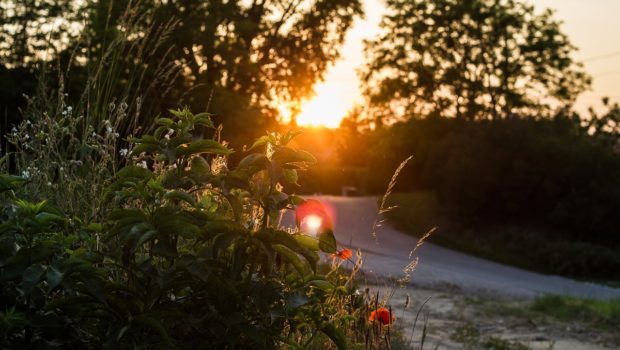Crisis or Opportunity
Part One: A World in Crisis
In the winter time we yearn for more light, and in challenging times like this we also wish to see the light of justice, health and understanding increase. But we first need to look squarely at the darkness: Climate change may be the worst disaster humanity has ever faced; politically, democracy isn’t spreading anymore, but instead it is in retreat across the globe; we have an addiction crisis and record levels of related ailments such as depression, loneliness, and loss of as sense of meaning. Jewishly, we, like all other religions and ethnic groups, are in a state decline in population, participation and affiliation.
This is a system in crisis. Our answers aren’t coming from more of the same. Albert Einstein said, “You can’t solve a problem with the same kind of thinking that got you into the problem in the first place.”
That is Organic Torah’s mission: to explore and promote a new paradigm that we’ll need if we want to succeed in facing these crises, uniting the ancient wisdom of Judaism with emergent modern strategies.
Part Two: How did We Get Here?
There is a common denominator that has brought us to this point and it is disconnection, isolation, and fragmentation. This is not at all an accident: since the time of the Scientific Revolution almost 400 years ago we in the Western world have acted as if the world is a machine to be observed, broken down into smallest components, controlled, and used. This way of thinking has been powerful, but it has also created its own problems.
We are suffering from separation from the earth, from nature, separation one another and ultimately separation from ourselves.
Part Three: A New Paradigm and an Opportunity for Integration
But the good news is that in reaction to all these problems, the Western world has started creating new forms of understanding which look at whole systems. Modern Systems Thinking in all its many forms shifts our paradigm: instead of breaking the world down and separating, we can start seeing the patterns, relationships and connections.
For example, modern medicine has achieved great things by isolating bacteria as the cause of diseases. But now, a systems approach is saying: we can be more effective by taking into account the whole human biome, literally an eco-system of bacteria that helps us stay healthy, and being more careful about using antibiotics; we can see how things like childhood trauma, or social isolation can increase disease by weakening our body’s defenses, and how our social connections increases health. We can look at the whole system instead of isolating one factor.
And here is more good news: Judaism, along with other traditional, earth-based modes of thought, has been thinking in these connecting, wholistic, what I’d call Organic, terms since ancient times. Finally, the modern and the ancient can work together!
Throughout modern times, Judaism has been at odds with the Western world, trying to fit in like a round peg in a square hole. It’s been “Either/Or”— either walling ourselves in with strong barriers against the dangers of assimilation, or trying to fit in and whittling away at our core practices, neatening up and smoothing over the messy parts of Judaism until we have the Judaism that I grew up with: a pale shadow of what it can be; a stale form without the fire and joy of life.
But, now, we have the opportunity to really integrate with the cutting edge of the modern world. Organic Torah is picking up on the desperate need of our times but even more so, on the amazing opportunity that is emerging only in our times: For the first time in centuries, with the turn of so many Western sciences and disciplines toward systems, networks, complex, emergent patterns, we have the opportunity to integrate our world, to see Judaism in both its own authentic shapes and patterns, and have it be in harmony with the most modern thinking.
Part Four: It’s About Love
I’ve always loved this pattern way of thinking: art and the patterns of color and light, or music and dance, with the patterns or sound and movement. I love nature, with its interdependent networks of living communities, and I love it when we humans live in harmony with those patterns as in organic, small scale farming. Years ago, I started putting the pieces together: making the connection between the ancient Jewish pattern thinking that I was finding in Jewish text learning and all these modern and natural patterns.
It is this love that drives me to do this work. Yes, we at Organic Torah try to solve the problems: reviving Judaism and Jewish learning, connecting Judaism to the essential work in environment, food ethics, addiction, crime and violence—but really, I do it because I love it. I also believe that no solution is really going to work if it isn’t coming from love, from beauty and joy.
Part Five: What Are We Doing?
This year at Organic Torah we are building a new online course and increasing our membership: The course is called “The Royal Road to Relational Spirituality.” It’s a year-long exploration of one book Derekh Ha’melekh, by the “Piazetzner Rebbe,” Rabbi Kalonymous Kalman Shapiro, an amazing teacher of these same principles that I love to talk about: relationships and wholeness.
I am completing the Organic Torah book, The Pearl and the Flame: Systems Thinking, Judaism and a Flourishing World, as well as blog posts, articles and essays.
I am teaching at many synagogues, Hillels, Moishe Houses, conferences, webinars and podcasts. And I am working on collaborative teaching with wonderful teachers such as Rabbi Laura Bellows, Rabbi Andrea Cohen-Keiner, Hellen Bennett, Rabbi Ariel Berger and others. Organic Torah is collaborating, together with Wilderness Torah, Kohenet, The Shalom Center and others, with the ALEPH Ordination Program in developing an Earth-Based Judaism track.
We at Organic Torah are focusing on young adults, planning a Boston Organic Torah Fellowship for Systems Thinking, Emergent Community and Torah. We are also bringing together a working group of young adults to talk with me about what they are looking for, learn about Organic Torah and tell me their concerns, their ideas and their hopes. I’m excited about this working group because they are a fantastic group of young adults from across the country working with me on putting together a learning program on a national level.
Part Six: How Can You Connect?
For all of these things I’m asking you to join us in the work. Me, Ilana, Erin Taylor, Organic Torah’s Operations Assistant, the board members, our great co-teachers, have a lot of energy and ideas, but we need you to help with whatever resources you can offer: monetary donations, certainly, but also networking, ideas and moral support. This is joyous work and vital work. I hope you’ll join us.






